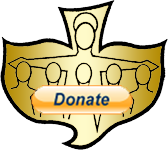|
|
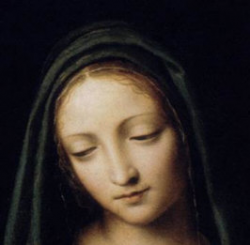 A Prayer for the New Year
A Prayer for the New YearCome, Holy Spirit Spirit of the Risen Christ, be with us today and always. Be our Light, our Guide, and our Comforter. Be our Strength, our Courage, and our Sanctifier. May this new year be a time of deep spiritual growth for us, A time of welcoming your graces and gifts, A time for forgiving freely and unconditionally, A time for growing in virtue and goodness. Come, Holy Spirit Be with us today and always. Mary, Mother of God, pray for us! Amen. 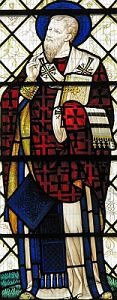 Born: 303, Cappadocia, Asia Minor.
Born: 303, Cappadocia, Asia Minor.Died: 390 of natural causes. Son of Saint Gregory of Nazianzen the Elder and Saint Nonna. Brother of Saint Caesar Nazianzen, and Saint Gorgonius. Spent an wandering youth in search of learning. Friend of and fellow student with Saint Basil the Great. Monk at Basil's desert monastery. Reluctant priest; he believed that he was unworthy, and that the responsibility would test his faith. He assisted his bishop father to prevent an Arian schism in the diocese. He opposed Arianism, and brought its heretical followers back to the fold. Bishop of Caesarea c.370, which put him in conflict with the Arian emperor Valens. The disputes led his friend Basil the Great, then archbishop, to reassign him to a small, out of the way posting at the edge of the archbishopric. Bishop of Constantinople from 381 to 390, following the death of Valens. He hated the city, despised the violence and slander involved in these disputes, and feared being drawn into politics and corruption, but he worked to bring the Arians back to the faith; for his trouble he was slandered, insulted, beaten up, and a rival "bishop" tried to take over his diocese. Noted preacher on the Trinity. When it seemed that orthodox Christianity had been restored in the city, Gregory retired to live the rest of his days as a hermit. He wrote theological discourses and poetry, some of it religious, some of it autobiographical. Father of the Church. Doctor of the Church. "God accepts our desires as though they were of great value. He longs ardently for us to desire and love him. He accepts our petitions for benefits as though we were doing him a favor. His joy in giving is greater than ours in receiving. So let us not be apathetic in our asking, nor set too narrow bounds to our requests; nor ask for frivolous things unworthy of God's greatness". - Saint Gregory Nazianzen 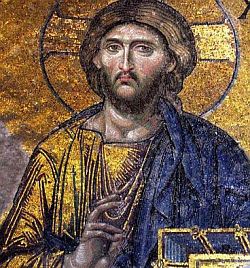 LITANY OF THE HOLY NAME OF JESUS...
LITANY OF THE HOLY NAME OF JESUS...Lord, have mercy on us. Christ, have mercy on us. Lord, have mercy on us. Jesus, hear us. Jesus, graciously hear us. God the Father of Heaven, have mercy on us (after each line) God the Son, Redeemer of the world, God the Holy Ghost, Holy Trinity, one God, Jesus, Son of the living God, Jesus, splendor of the Father, Jesus, brightness of eternal light, Jesus, King of glory, Jesus, sun of justice, Jesus, Son of the Virgin Mary, Jesus, most amiable, Jesus, most admirable, Jesus, the mighty God, Jesus, father of the world to come, Jesus, Angel of great counsel, Jesus, most powerful, Jesus, most patient, Jesus, most obedient, Jesus, meek and humble of heart, Jesus, lover of chastity, Jesus, lover of us, Jesus, God of peace, Jesus, author of life, Jesus, example of virtues, Jesus, zealous lover of souls, Jesus, our God, Jesus, our refuge, Jesus, father of the poor, Jesus, treasure of the faithful, Jesus, good Shepherd, Jesus, true light, Jesus, eternal wisdom, Jesus, infinite goodness, Jesus, our way and our life, Jesus, joy of Angels, Jesus, King of Patriarchs, Jesus, Master of the Apostles, Jesus, Teacher of the Evangelists, Jesus, strength of Martyrs, Jesus, light of Confessors, Jesus, purity of Virgins, Jesus, crown of all Saints, Be merciful, spare us, O Jesus. Be merciful, graciously hear us, O Jesus. From all evil, deliver us, O Jesus. (after each line) From all sin, From Thy wrath, From the snares of the devil, From the spirit of fornication, From everlasting death, From the neglect of Thine inspirations, By the mystery of Thy holy Incarnation, By Thy Nativity, By Thine Infancy, By Thy most divine Life, By Thy labors, By Thine agony and Passion, By Thy Cross and dereliction, By Thy sufferings, By Thy Resurrection, By Thine Ascension, By Thine institution of the most Holy Eucharist, By Thy joys, By Thy glory, Lamb of God, Who takest away the sins of the world, Spare us, O Jesus. Lamb of God, Who takest away the sins of the world, Hear us, O Jesus. Lamb of God, Who takest away the sins of the world, Have mercy on us, O Jesus. Jesus, hear us. Jesus, graciously hear us. Let us pray. O Lord Jesus Christ, who hast said: Ask and ye shall receive, seek, and ye shall find, knock, and it shall be opened unto you; mercifully attend to our supplications, and grant us the gift of Thy divine charity, that we may ever love Thee with our whole heart and with all our words and deeds, and may never cease from praising Thee. Make us, O Lord, to have a perpetual fear and love of Thy holy Name, for Thou never failest to help and govern those whom Thou dost bring up in Thy steadfast fear and love; who livest and reignest for ever and ever. Amen. 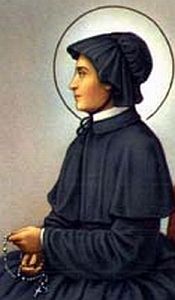 Born: 1774 in New York City.
Born: 1774 in New York City.Died: 1821 in Emmitsburg, Maryland. Born into a wealthy and influential Episcopalian family, the daughter of a Dr Richard Bayley; Elizabeth was raised in the New York high society of the late 18th century. Her mother died when Elizabeth was three years old, her baby sister a year later. In 1794 at age 19 she married the wealthy businessman William Magee Seton, and was the mother of five. About ten years into the marriage, William's business failed, and soon after he died of tuberculosis, leaving Elizabeth an impoverished widow with five small children. For years Elizabeth had felt drawn to Catholicism, believing in the Real Presence in the Eucharist and in the lineage of the Church going back to Christ and the Apostles. She converted to Catholicism, entering the Church on 14 March 1805, alienating many of her strict Episcopalian family in the process. To support her family, and insure the proper education of her children, she opened a school in Boston. Though a private and secular institution, from the beginning she ran it along the lines of a religious community. At the invitation of the archbishop, she established a Catholic girl's school in Baltimore, Maryland which initiated the parochial school system in America. To run the system she founded the Sisters of Charity in 1809, the first native American religious community for women. "We must pray without ceasing, in every occurrence and employment of our lives - that prayer which is rather a habit of lifting up the heart to God as in a constant communication with Him". - Saint Elizabeth Ann Seton Prayer... "Lord Jesus, Who was born for us in a stable, lived for us a life of pain and sorrow, and died for us upon a cross; say for us in the hour of death, Father, forgive, and to Your Mother, Behold your child. Say to us, This day you shall be with Me in paradise. Dear Savior, leave us not, forsake us not. We thirst for You, Fountain of Living Water. Our days pass quickly along, soon all will be consummated for us. To Your hands we commend our spirits, now and forever. Amen." - prayer by Elizabeth Ann Seton 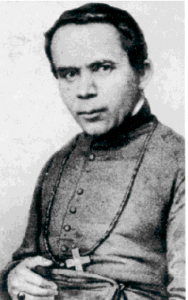 Born: 1811, Bohemia (Czech Republic)
Born: 1811, Bohemia (Czech Republic)Died: 1860 of a stroke on the corner of 13th & Vine Sts. in Philadelphia, Pennsylvania. Son of Philip, who was German and owned a stocking factory, and Agnes Neumann who was Czech. John was a small and quiet boy with four sisters and a brother, and was named after Saint John Nepomucene. An excellent student, John early felt drawn to religious life. Seminarian at Budweis, Bohemia in 1813, he studied astronomy and botany in addition to theological topics. Studied theology at Charles Ferdinand University at Prague in 1833. When time came for John's ordination, his bishop was sick; the ordination was never re-scheduled as Bohemia had an over-abundance of priests. John decided to go to America to ask for ordination, and to work with emigres. He walked most of the way to France, then took ship for America. John arrived unannounced in Manhattan in 1836. Bishop John Dubois was happy to see him as there were 36 priests for the 200,000 Catholics in New York and New Jersey. John was ordained on 28 June 1836, and sent to Buffalo. There the parish priest, Father Pax, gave him the choice of the city of Buffalo or of the rural area; John chose the more difficult country area. He stayed in a small town with an unfinished church, and when it was completed, he moved to a town with a log church. There he built himself a small log cabin, rarely lit a fire, slept little, often lived on bread and water, and walked miles to visit farm after remote farm. John's parishioners were from many lands and tongues, but John knew twelve languages, and worked with them all. He joined the Redemptorists at Pittsburgh, Pennsylvania in 1840, taking his vows at Baltimore, Maryland in 1841, the first Redemptorist to do so in the United States. Home missioner in Maryland, Ohio, Pennsylvania, and Virginia. Rector of Saint Philomena church in Pittsburgh in 1844. Vice-regent and superior of the Redemptorists in America in 1847. Bishop of Philadelphia, Pennsylvania in 1852. Bishop John built fifty churches and began building a cathedral. He opened almost one hundred schools, and the number of parochial school students in his diocese grew from 500 to 9,000. He wrote newspaper articles, two catechisms, and many works in German. First American man and first American bishop to be canonized. Prayer... Merciful Father, You have given me all that I have in this world, even life itself. In all my daily needs, help me to remember the needs of others too. Make me aware of the need to pray to You not just for myself but for the Church, the Pope for the clergy and for people who suffer any need. Make me as selfless as Saint John Neumann. Throughout my life, give me the grace to direct my first thoughts to the service of You and of others. Make my prayer - "Your will be done" knowing that in Your mercy and love, Your will for me is my sanctification. I ask this through Jesus Christ, Our Lord. Amen. 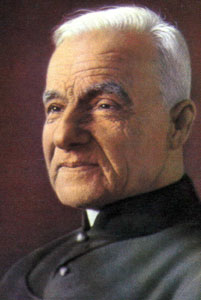 1845-1937
1845-1937Born & Died in Montreal, Quebec, Canada. Son of a woodcutter, and eighth of twelve children. His father died in a work-related accident, his mother of tuberculosis, and he was adopted at age twelve by a farmer uncle who insisted he work for his keep. Over the years Andre worked as a farmhand, shoemaker, baker, blacksmith, and factory worker. At 25 he applied to join the Congregation of the Holy Cross; Andre was initially refused due to poor health, but he gained the backing of Bishop Bourget, and was accepted. Doorkeeper at Notre Dame College, Montreal, Quebec, Canada. Sacristan, laundry worker and messenger. He spent much of each night in prayer, and on his window sill, facing Mount Royal, was a small statue of Saint Joseph, to whom Andre was especially devoted. "Some day," Andre believed, "Saint Joseph will be honored on Mount Royal." Andre had a special ministry to the sick. He would rub the sick person with oil from a lamp in the college chapel, and many were healed. Word of his power spread, and when an epidemic broke out at a nearby college, Andre volunteered to help; no one died. The trickle of sick people to his door became a flood. His superiors were uneasy; diocesan authorities were suspicious; doctors called him a quack. "I do not cure," he always said; "Saint Joseph cures." By his death, he was receiving 80,000 letters each year from the sick who sought his prayers and healing. For many years the Holy Cross authorities had tried to buy land on Mount Royal. Brother Andre and others climbed the steep hill and planted medals of Saint Joseph on it, and soon after, the owners yielded, which incident helped the current devotion to Saint Joseph by those looking to buy or sell a home. Andre collected money to build a small chapel and received visitors there, listening to their problems, praying, rubbing them with Saint Joseph's oil, and curing many. The chapel is still in use. Prayer... Lord our God, friend of the lowly, you gave your servant, Brother Andre, a great devotion to St. Joseph and a special commitment to the poor and afflicted. Through his intercession help us to follow his example of prayer and love and so come to share with him in your glory. (mention your intention) We ask this in the name of Jesus the Lord. Amen. St. Andre Bessette, pray for us! 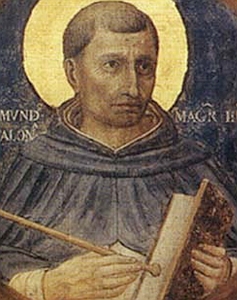 Born: 1175 at Penafort, Catalonia, Spain.
Born: 1175 at Penafort, Catalonia, Spain.Died: 1275. Born to the Aragonian nobility. Educated at the cathedral school in Barcelona, Spain. Philosophy teacher around age 20. Priest. Graduated law school in Bologna, Italy. Joined the Dominicans in 1218. Summoned to Rome, Italy in 1230 by Pope Gregory IX. Assigned to collect all official letters of the popes since 1150. Raymond gathered and published five volumes, and helped write Church law. Chosen master general of the Dominicans in 1238. Reviewed the Order's Rule, made sure everything was legally correct, then resigned his position in 1240 to dedicate himself to parish work. He was offered and archbishopric, but he declined, instead returning to Spain and the parish work he loved. His compassion helped many people return to God through Reconciliation. During his years in Rome, Raymond heard of the difficulties missionaries faced trying to reach non-Christians of Northern Africa and Spain. Raymond started a school to teach the language and culture of the people to be evangelized. With Saint Thomas Aquinas, he wrote a booklet to explain the truths of faith in a way that non-believers could understand. His great influence on Church law led to his patronage of lawyers. "Look then on Jesus, the author and preserver of faith: in complete sinlessness he suffered, and at the hands of those who were his own, and was numbered among the wicked. As you drink the cup of the Lord Jesus (how glorious it is!), give thanks to the Lord, the giver of all blessings. May the God of love and peace set your hearts at rest and speed you on your journey; may he meanwhile shelter you from disturbance by others in the hidden recesses of his love, until he brings you at last into that place of complete plenitude where you will repose for ever in the vision of peace, in the security of trust, and in the restful enjoyment of his riches". - from a letter by St. Raymond 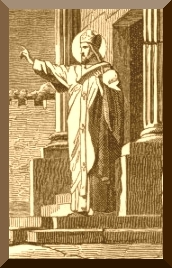 Born: 175
Born: 175Second century bishop of Heirapolis, Phrygia. Held in high regard by other early saints including Saint Jerome and the historian Theodoret. Noted for writing a defense of the faith to Emperor Marcus Aurelius that reminded the Emperor of a miraculous victory that resulted from the prayers of Christian soldiers, and of his promise of protection for Christians. Worked and wrote against all the major heresies of his time, refuting them by logically destroying the heresy's philosophical roots. A prolific writer, most of his work has been lost over the centuries. "We therefore grossly deceive ourselves in not allotting more time to the study of divine truths. It is not enough barely to believe them, and let our thoughts now and then glance upon them: that knowledge which shows us heaven, will not bring us to the possession of it, and will deserve punishments, not rewards, if it remain slight, weak, and superficial. By serious and frequent meditation it must be concocted, digested, and turned into the nourishment of our affections, before it can be powerful and operative enough to change them, and produce the necessary fruit in our lives. For this all the saints affected solitude and retreats from the noise and hurry of the world, as much as their circumstances allowed them." - St. Apollinaris 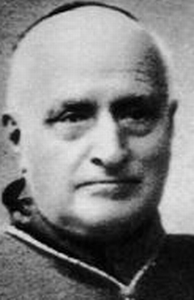 Born in Genoa, Italy, 1818.
Born in Genoa, Italy, 1818.Died, 1901. Son of the Marquis of Reggio and Angela Pareto. Felt a call to the priesthood at age 20; ordained on 18 September 1841. Vice-rector of the seminary in Genoa, Italy at age 25. Rector of the Chiavari seminary. Helped found The Catholic Standard, the first Catholic newspaper. In 1865 the Standard and 25 other papers supported slates of Catholic candidates, hoping to found a Catholic political party. However, in 1874 Catholics were told they could not vote, and he closed the paper. Bishop of Ventimiglia in 1877; the diocese was so poor, he had to travel on a mule. Opened new parishes, organized three synods and liturgical revival, set up teaching programs. Prayed every night from 3 to 6 a.m., and never let anyone see him worry. Founded the Sisters of Saint Martha in 1878, a congregation devoted to caring for the poor. Following an earthquake in 1887, he worked with the injured in the rubble, and ordered his priests to use all resources to help the displaced. Founded orphanages at Ventimiglia and San Remo to house, educate, and train children who had lost their families in the quake. In 1892 he asked the Pope to relieve him of his duties; the Pope appointed him archbishop of Genoa. The city was politically complex and tense, but his humble, open, pious generosity won over many, and people in and out of the Church came to him with problems. Set up a network to help immigrants, worked for Catholic lay associations, supported limited work hours and complete days off for working people - radical notions in those days. "Be doers of the word, and not hearers only" (Jas 1: 22). These words of the Apostle James make us think of the life and apostolate of Tommaso Reggio, a priest and journalist who later became Bishop of Ventimiglia and finally Archbishop of Genoa. He was a man of faith and culture, and as a Pastor he knew how to be an attentive guide to the faithful in every circumstance. Sensitive to the many sufferings and the poverty of his people, he took responsibility for providing prompt help in all situations of need. Precisely with this in mind, he founded the religious family of the Sisters of Saint Martha, entrusting to them the task of assisting the Pastors of the Church especially in the areas of charity and education. His message can be summed up in two words: truth and charity. Truth, first of all, which means attentive listening to God's word and courageous zeal in defending and spreading the teachings of the Gospel. Then charity, which spurs people to love God and, for love of him, to embrace everyone since they are brothers and sisters in Christ. If there was a preference in Tommaso Reggio's choices, it was for those who found themselves in hardship and suffering. This is why he is presented today as a model for Bishops, priest and lay people, as well as for those who belong to his spiritual family. - from the homily of Pope John Paul II at the beatification of Blessed Tommaso 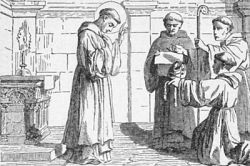 Born: 12th Century in Nevers, France.
Born: 12th Century in Nevers, France.Died: 1209 at Bourges, France while in prayer. Member of the family of the Counts of Nevers, his father Baldwin planned a military life for William. Educated by his maternal uncle, Peter the Hermit, archdeacon of Soissons, France. Drawn to religious life from an early age, William became a priest, canon of Soissons, and canon of Paris. Monk in the Order of Grandmont, noted for his austerities, his devotion to the Blessed Sacrament, and for the time spent praying at the altar. Internal dissension in the Order caused him to leave Grandmont for the recently formed Cistercians, taking the habit at Pontigny. Abbot at Fontaine-Jean in Sens, France. Abbot at Chaalis near Senlis, France in 1187. Reluctant archbishop of Bourges, France in 1200, accepting the position only after receiving orders from the general of his order, and from Pope Innocent III. Lived an even more austere life, defended clerical rights against the state, cared personally for the poor, sick, imprisoned and debauched, and converted many Albigensians in his diocese to orthodox Christianity. Witnesses claim he performed 18 miracles during his life, and another 18 after his death. Prayer... St. William, you were a father to your monks and a shepherd to your people. Pray now before God's heavenly altar that we might form a truly Eucharistic community, alert to the Presence of Christ in our hearts and in our church, eager to share our Catholic faith with people everywhere, and especially intent on welcoming our disadvantaged brothers and sisters. Amen. 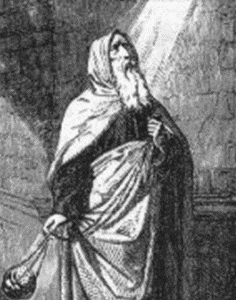 Born: 423, Cappadocia (modern Turkey)
Born: 423, Cappadocia (modern Turkey)Died: 529. Formed a small community of monks near Bethlehem, which later became the Monastery of St. Theodosius. He died near Jerusalem at about 105 years old. Born to a pious family, he began his studies at an early age, and became a lector while still a youth. The example of Abraham led him to leave home in order to properly follow God. He met Saint Simeon Stylites in Antioch; Simeon recognized him as a holy man and leader, and invited Theodosius onto his pillar for prayer, blessing, and advice. Travelled to Jerusalem where legend says worked with Saint Longinus the Centurian, who would have been nearly 500 years old at the time. Head of a church near Bethlehem. Hermit in the desert of Judah, living in a cave. Word of his holiness began to attract disciples, and Theodosius built a monastery at Cathismus to house them. There were so many there had to be a section for Greeks, for Armenians, for Persions, etc., but they all happily worked and prayed together. Next to the monastery he built a hospital for the sick, a hospice for the aged, and a mental hospital. Friend of and co-worker with Saint Sabbas. Appointed visitor to all cenobitical communities of Palestine the patriarch of Jerusalem. Opposed heresies, including Eutychianism and Monophysitism. Emperor Anastatius, a supporter of Eutychianism, sent Theodosius a large bribe, hoping to sway the influential monk to his thinking; Theodosius distributed the money to the poor, and continued to preach against heresy. Because of his orthodox views, Anastatius removed him from his position in 513, but he soon resumed his duties under emperor Justinian. In poor health in his old age, he was stricken with a condition that made his skin dry as stone. He continued to work until his health gave out, and then he spent his time praying for his community. He died at age 105. Prayer... With the rivers of your tears, you have made the barren desert fertile. Through sighs of sorrow from deep within you, your labors have borne fruit a hundred-fold. By your miracles you have become a light, shining upon the world. O Theodosius, pray to Christ our God, to save our souls. 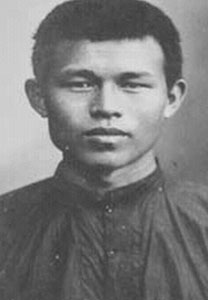 1895-1944
1895-1944Beatified by Pope John Paul II in March, 2000 One of six children. His parents were converts, and he was raised as a Christian. Entered the Hang Xan Minor Seminary at age 13, and the Penang Major Seminary, Malaysia in 1920. Ordained in the archdiocese of Bangkok, Thailand in 1926. Pastor at Bang Nok Khneuk and Phitsanulok. Missionary to northern Vietnam from 1930 to 1937, working to bring back Catholics who had fallen from their practice due to poverty. When war broke out between France and Indochina, Nicholas was accused of spying for the French. In 1941 he was arrested and sentenced to 10 years in prison. There he contracted tuberculosis which, with the hardships of prison, eventually killed him, but not before he spent two years bringing the faith to his fellow prisoners, baptizing at least 68. Thailand's first martyr priest. Blessed Nicolas, pray for us!  Born in Poitiers, France in 315.
Born in Poitiers, France in 315.Died, 368. Born to wealthy polytheistic, pagan nobility, Hilary's early life was uneventful as he married, had children (including Saint Abra), and studied on his own. Through his studies he came to believe in salvation through good works, then monotheism. As he studied the Bible for the first time, he literally read himself into the faith, and was converted by the end of the New Testament. Hilary lived the faith so well he was made bishop of Poitiers from 353 to 368. Hilary opposed the emperor's attempt to run Church matters, and was exiled; he used the time to write works explaining the faith. His teaching and writings converted many, and in an attempt to reduce his notoriety he was returned to the small town of Poitiers where his enemies hoped he would fade into obscurity. His writings continued to convert pagans. He introduced Eastern theology to the Western Church, fought Arianism with the help of Saint Viventius, and was proclaimed a Doctor of the Church in 1851. Prayer Acknowledging That God Is In His Creation... "When I look at your heavens, according to my own lights, with these weak eyes of mine, I am certain with reservation that they are your heavens. The stars circle in the heavens, reappear year after year, each with a function and service to fulfill. And though I do not understand them, I know that you, O God, are in them." - St. Hilary of Poitiers 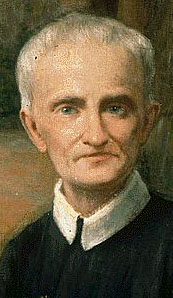 Born, 1809 in Holland
Born, 1809 in HollandDied, 1887 in Batavia, Surinam Son of Arnold Denis Donders and Petronella van den Brekel. Peter grew up poor, rarely getting to school, working at home and in a local factory with his brother Martin, and dreaming of becoming a priest. With the help of local priests and a wealthy patron, he enter the seminary at the College of Herlaar at age twenty-two, initially working as a servant while he studied. At age twenty-six her applied to the Franciscans, Jesuits and Redemptorists, but was turned down by each. Ordained on 5 June 1841 after nearly ten years of work. Missionary to the Dutch colony in Surinam, Dutch Guiana, arriving in Paramaribo on 16 September 1842. Evangelized and ministered to plantation slaves, constantly in touch with his superiors to complain of the terrible treatment of the workers. He baptized at least 1200 in his first couple of years, and worked among the sick during an epidemic in 1851. Transferred to the leper colony of Batavia in 1856. There he ministered to both the body and soul of the 600 or so patients. His constant harassment of the colonial authorities resulted in much better care for the patients. When the Redemptorists arrived in Surinam in 1866 to take charge of the mission, Peter joined the Order, becoming a 57 year old novice in 1866, and making his final vows on 24 June 1867. He then returned to Batavia with a crew of Redemptorists ready to help the lepers. With the added help, Father Peter expanded his work, and began to evangelize the Indians in the region. He learned their languages and had made a good start on the work when his health failed. His superiors transferred him to easier assignments, but as the end approached, Peter returned to Batavia where he worked with the patients until his end. "We can say that he was an apostle of the poor. In fact, he was born into a poor family and had to lead the life of a worker before he could pursue his priestly vocation. He dedicated his whole priestly life to the poor. In addition, he is an invitation and an incentive for the renewal and reflourishing of the missionary thrust which in the last century and in this one has made an exceptional contribution to carrying out of the Church's missionary duty. Joining the Congregation of the Most Holy Redeemer late in life, he practiced in an excellent way what Saint Alphonsus proposed as an ideal for his religious: imitate the virtues and examples of the Redeemer in preaching the divine word to the poor." -Pope John Paul II in the beatification homily for Blessed Peter Prayer... "Healing God, you showed your wonderful mercy toward lepers through Blessed Peter Donders, your priest. By his example and prayers, may we serve you through our loving care for those in greatest need. We ask this through our Lord Jesus Christ, who lives and reigns with you and the Holy Spirit, for ever and ever. Amen." 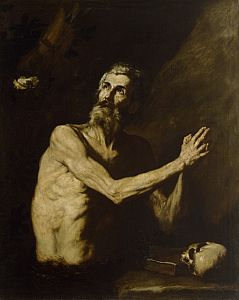 Born: 230, Lower Thebes, Egypt.
Born: 230, Lower Thebes, Egypt.Died: 342. Paul grew up in an upper-class, Christian family. He was well educated, fluent in Greek and Egyptian. His parents died when the boy was 15. When the persecutions of Decius began a few years later, Paul fled into the desert to escape both them, and the machinations of his brother Peter and other family members who wanted his property. He lived as a desert hermit in a cave the remainder of his 113 year life, surviving off fruit and water, wearing leaves or nothing, spending his time in prayer; legend says a raven kept him supplied with bread. Late in life he came to know, and was buried by Saint Anthony the Abbot. Saint Paul The Hermit who was the first of the Desert Fathers. The only recorded information on his life and religious influence is from the original Latin account which was written by Saint Jerome. Saint Paul was the first of these men who retired to the Desert and spent their lives in solitude, prayer and meditation. He was soon followed by a large number of others, the best known of whom is Saint Antony, a devotee of Saint Paul, who led the largest community of these men in the Desert. They became known as Anchorites which by dictionary definition is "a hermit or recluse, one who retires to a solitary place, specifically to devote himself to religious duties." 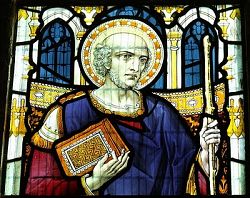 Born: 567, Munster, Ireland.
Born: 567, Munster, Ireland.Died: 648 at Mezerolles, France. Buried at Peronne, Picardy, France. Irish Monastic Founder. Praised by St. Bede. Son of an Irish prince. Brother of Saint Foillan and Saint Ultan. Educated by Saint Brendan the Voyager. Priest. Abbot of a house at Rathmat, Ireland. Preached, evangelized, and established monasteries in Ireland for twelve years. Evangelized in England, building monasteries. Evangelized in France, working with Saint Blitharius; they had great success. Clovis, king of the Franks, received him, and asked that he build a house at Lagny, France. Raised the young son of a court nobleman from the dead. Given to ecstacies and trances during which he received visions of a immense struggle between good and evil, with glimpses of heaven and hell. The visions were described in the aptly named Visions of Fursey, and had a great effect on such works as Dante's Divine Comedy. Bede wrote extensively and glowingly of Fursey. His image is on the banner of the city of Peronne, France. The Prayer of St. Fursey... The arms of God be around my shoulders, The touch of the Holy Spirit upon my head, The sign of Christ's cross upon my forehead, The sound of the Holy Spirit in my ears, The fragrance of the Holy Spirit in my nostrils, The vision of heaven's company in my eyes, The conversation of heaven's company on my lips, The work of God's church in my hands, The service of God and the neighbor in my feet, A home for God in my heart, And to God, the Father of all, my entire being. Amen. 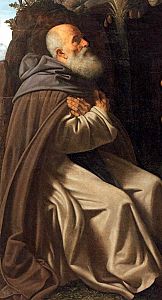 Born: 251 at Heracleus, Egypt.
Born: 251 at Heracleus, Egypt.Died: 356. Following the death of his parents when he was about 20, Anthony insured that his sister completed her education, then he sold his house, furniture, and the land he owned, gave the proceeds to the poor, joined the anchorites who lived nearby, and moved into an empty sepulchre. At age 35 he moved to the desert to live alone; he lived 20 years in an abandoned fort. Anthony barricaded the place for solitude, but admirers and would-be students broke in. He miraculously healed people, and agreed to be the spiritual counselor of others. His recommendation was to base life on the Gospel. Word spread, and so many disciples arrived that Anthony founded two monasteries on the Nile, one at Pispir, one at Arsinoe. Many of those who lived near him supported themselves by making baskets and brushes, and from that came his patronage of those trades. Anthony briefly left his seclusion in 311, going to Alexandria, Egypt to fight Arianism, and to comfort the victims of the persecutions of Maximinus. At some point in his life, he met with his sister again. She, too, had withdrawn from the world, and directed a community of nuns. Anthony retired to the desert, living in a cave on Mount Colzim. Descriptions paint him as uniformly modest and courteous. His example led many to take up the monastic life, and to follow his way. Late in life Anthony became a close friend of Saint Paul the Hermit, and he buried the aged anchorite, leading to his patronage of gravediggers. His biography was written by his friend Saint Athanasius of Alexandria. His relationship with pigs and patronage of swineherds is a little complicated. Skin diseases were sometimes treated with applications of pork fat, which reduced inflammation and itching. As Anthony's intervention aided in the same conditions, he was shown in art accompanied by a pig. People who saw the art work, but did not have it explained, thought there was a direct connection between Anthony and pigs - and people who worked with swine took him as their patron. Prayer... Father, you called Saint Anthony to renounce the world and serve you in the solitude of the desert. By his prayers and example, may we learn to deny ourselves and love you above all things. We ask this through our Lord Jesus Christ, your Son, who lives and reigns with you and the Holy Spirit, one God, for ever and ever. Amen. 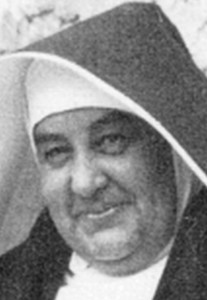 Born: 1881, Genoa, Italy.
Born: 1881, Genoa, Italy.Died: 1947...buried next to St. Rita of Cascia. Taught catechism to children. She grew to love Augustinian spirituality, and became acquainted with the human and spiritual adventure of Rita of Cascia, whose canonization in 1900 was very special to Maria, leading to her desire to be an Augustinian religious in the monastery of Cascia, Italy. She entered in June 1906 at age 25, made her initial vows on Christmas 1907, taking the name Maria Teresa. The community was in sad decline when Maria Teresa entered, and she became disillusioned. In 1911, she stayed her family for a period of reflection, but returned to the convent, taking her solemn vows on 22 March 1912. Novice mistress in 1914. After writing letters about the terrible spiritual condition of the community, she was appointed vicar from 1917 to 1920, and abbess from 1920 till her death in 1947. The little chapel containing Saint Rita's body was almost unknown when Mother Maria entered the monastery. Today the basilica is a place of pilgrimage for thousands who learned of Rita through the pamphlet, Dalle Api alle Rose, which Mother Maria started in 1923. Mother Maria's dream was to bring people to God through Saint Rita - and it has worked. The monastery took in orphan girls, and many live in the modern "Saint Rita's Hive" next to the church. An Augustinian seminary, a hospital, retreat house, and other services grew up around the chapel. Mother Maria Teresa's love was the cause of it all, her spirit sustaining her frail body through the years and work. "I love him even if it costs much, I love him because it is worth much, I love him at all cost." - Mother Maria Teresa 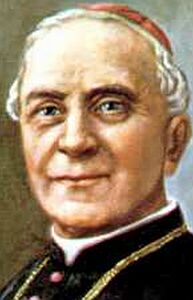 Born: 1842 in Poland.
Born: 1842 in Poland.Died: 1924. Raised in a pious family. Studied in Rzeszów, and entered the seminary at Przemysl in 1860. Ordained on 17 July 1864. Parish priest at Sambor. Transferred to Rome in 1866, he studied at the Collegium Romanum (Gregorian University) and the Institute of Saint Apollinaris (Lateran University). Doctor of theology and a canon lawyer. Professor at the seminary at Przemysl from 1869 to 1877, and at the University of Krakow from 1877 to 1899, he was known as a great educator who was always available to students. Dean of the Theology Department. Rector of the University of Krakow from 1882 to 1883. All the while he was teaching Joseph was still involved at the parish level. He worked with the Saint Vincent de Paul Society and was president of the Society for the Education of the People for 16 years. He started hundreds of libraries, delivered free lectures, published over a thousand books, wrote several books of history, theology and canon law himself, and started a school for servants. He founded the Fraternity of Our Lady, Queen of the Polish Crown in 1891; the Fraternity cared for the poor, orphans, apprentices, servants, the sick and unemployed. Founded the Congregation of Sister Servants of the Most Sacred Heart of Jesus on 15 April 1894 in Krakow to work with the sick and spread devotion to the Sacred Heart of Jesus. Bishop of Przemysl in 1900 until his death in 1924. He made frequent visits to the parishes, supported the religious orders, conducted three synods, and worked for the education and religious formation of his priests. He encouraged devotion to the Blessed Sacrament, Eucharistic devotions, the Sacred Heart of Jesus, and the Virgin Mary. He built and restored churches, built nurseries, kitchens, homeless shelters, schools for the poor, and gave tuition assistance to poor seminarians. He worked for the implementation of the social doctrine described in the writings of Pope Leo XIII. He left behind a large body of work including books, pastoral letters, sermons, addresses, prayers and other writings. "The late Bishop of Przemysl personified the most beautiful qualities and talents of the episcopate. Witness his tireless pastoral zeal, his spirit of initiative combined with energy manifested in action; witness the splendor of his scholarship, or, even more noteworthy, the sanctity of his virtues; witness above all the shining example of his exceptional work combined with a truly youthful enthusiasm." - Father Antoni Bystrzonowski, Saint Joseph's student and successor 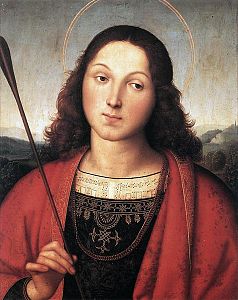 Born: Narbonne, Gaul (part of modern France)
Born: Narbonne, Gaul (part of modern France)Died: Martyred, 288 at Rome, Italy Son of a wealthy Roman family. Educated in Milan. Officer of the Imperial Roman army, and captain of the guard. Favorite of Diocletian. During Diocletian's persecution of the Christians, Sebastian visited them in prison, bringing supplies and comfort. Reported to have healed the wife of a brother soldier by making the Sign of the Cross over her. Converted soldiers and a governor to Christianity. Charged as a Christian, Sebastian was tied to a tree, shot with arrows, and left for dead. He survived, and with the help of Saint Irene, recovered, and returned to preach to Diocletian. The emperor then had him beaten to death. During the 14th century, the random nature of infection with the Black Death caused people to liken the plague to their villages being shot by an army of nature's archers. In desperation, they prayed for the intercession of a saint associated with archers, and Saint Sebastian became associated with the plague. Prayer... O Lord, grant us a spirit of strength. Taught by the glorious example of Your martyr, Saint Sebastian, may we learn to obey You rather than men. Amen. 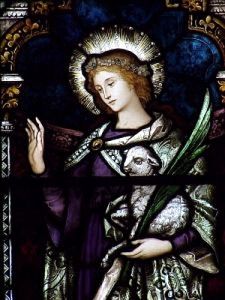 Martyred: 304.
Martyred: 304.Foster-sister of Saint Emerentiana. At age 12 or 13 Agnes was ordered to sacrifice to pagan gods and lose her virginity by rape. She was taken to a Roman temple to Minerva (Athena), and when led to the altar, she made the Sign of the Cross. She was threatened, then tortured when she refused to turn against God. Several young men presented themselves, offering to marry her, whether from lust or pity is not known. She said that to do so would be an insult to her heavenly Spouse, that she would keep her consecrated virginity intact, accept death, and see Christ. Martyr. Mentioned in first Eucharistic prayer. On her feast day two lambs are blessed at her church in Rome, Italy and then their wool is woven into the palliums (bands of white wool) which the pope confers on archbishops as symbol of their jurisdiction. "Christ made my soul beautiful with the jewels of grace and virtue. I belong to Him whom the angels serve." - Saint Agnes 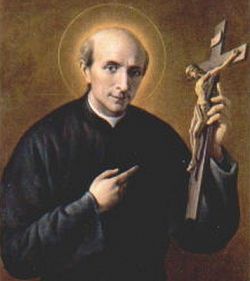 Born 1795, Rome, Italy.
Born 1795, Rome, Italy.Died: 1850. Born to the Italian nobility. Priest. Taught theology. He lived in constant danger working with the sick during a cholera epidemic. Highly successful fund-raiser for charities for the poor. Founded guilds for workers, agricultural schools, loan associations, orphanages and homes for girls. Felt a strong calling to bring Christ to Muslims, and founded a program to incorporate lay people in the apostolate of priests. Founded the Pious Society of Missions (Pallottines) for urban mission work. Started the special observance of the Octave of Epiphany for the reunion of the Eastern and Roman Churches, and the return of the Church in England. Not the goods of the world, but God. Not riches, but God. Not honors, but God. Not distinction, but God. Not dignities, but God. Not advancement, but God. God always and in everything. - Saint Vincent Pallotti 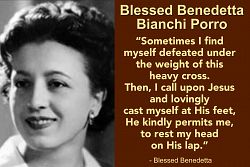 1936 - 1964, Italian laywoman.
1936 - 1964, Italian laywoman. When she was three months old, she contracted polio, a disease which impacted the rest of her life. She was devoted to her faith in her youth, and in 1953, she began medical school. However, her time in medical school was cut short when a rare medical condition led to her needing many surgeries and an overall decline in her health. Her first operation in 1958 caused partial paralysis on the left side of her face; a second operation in August 1959 left her completely paralyzed and reliant on a wheelchair. she also began to lose the five senses on a gradual level. Throughout her suffering, she looked to the Blessed Mother to help her through her challenges. In May 1962 she undertook a pilgrimage to Lourdes seeking a miracle for her ailments. There, she met 22-year-old Maria who was sobbing beside her. Porro took her hand and urged her to beseech the Blessed Virgin Mary for her intercession, at which point Maria was healed. Benedetta's health took a dramatic decline after her pilgrimage to Lourdes, and on the night of 22 January 1964 said to her nurse: "Emilia, tomorrow I will die. I feel very ill". Porro died in the morning of 23 January 1964 after receiving Communion and Reconciliation. 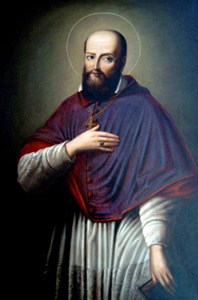 Born: 1567, Chateau de Thorens, Savoy (part of modern France)
Born: 1567, Chateau de Thorens, Savoy (part of modern France)Died: 1622, Lyon, France Born in the castle of Chateau de Thorens to a well-placed Savoyard family, the eldest of twelve children born to Francois de Boisy and Francoise de Sionnz. His parents intended that Francis become a lawyer, enter politics, and carry on the family line and power. He studied at La Roche and Annecy in France, taught by Jesuits. Attended the College de Clermont in Paris, France at age 12. In his early teens, Francis began to believe in pre-destination, and was so afraid that he was pre-emptorily condemned to Hell that he became ill and eventually was confined to bed. However, in January 1587 at the Church of Saint Stephen, he overcame the crisis, decided that whatever God had in store for him was for the best, and dedicated his life to God. Studied law and theology at the University of Padua, Italy, and earned a doctorate in both fields. He returned home, and found a position as Senate advocate. It was at this point that he received a message telling him to "Leave all and follow Me." He took this as a call to the priesthood, a move his family fiercely opposed, especially when he refused a marriage that had been arranged for him. However, he pursued a devoted prayer life, and his gentle ways won over the family. Priest. In 1593 he was appointed provost of the diocese of Geneva, Switzerland, a stronghold of Calvinists. Preacher, writer and spiritual director in the district of Chablais. His simple, clear explanations of Catholic doctrine, and his gentle way with everyone, brought many back to the Roman Church. He even used sign language in order to bring the message to the deaf, leading to his patronage of deaf people. Bishop of Geneva in 1602. He traveled and evangelized throughout the Duchy of Savoy, working with children whenever he could. Friend of Saint Vincent de Paul. He turned down a wealthy French bishopric to continue working where God had placed him. With Saint Jeanne de Chantal he helped found the Order of the Visitation . A prolific correspondent, many of his letters have survived. The value of his writings led to his being declared a Doctor of the Church by Pope Blessed Pius IX in 1877, and a patron of writers and journalists by Pope Pius XI in 1923. The Salesians of Don Bosco, the Oblates of Saint Francis de Sales, and the Missionaries of Saint Francis de Sales are named in his honor as is the Saint Francois Atoll in the Seychelles Islands. "Do not lose courage in considering your own imperfections, but instantly set about remedying them." - Saint Francis de Sales 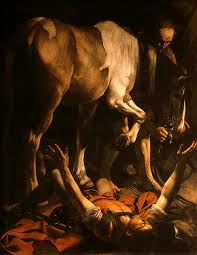 The great Apostle Paul, named Saul at his circumcision, was born at Tarsus, the capital of Cilicia, and was by privilege a Roman citizen, to which quality a great distinction and several exemptions were granted by the laws of the empire. He was early instructed in the strict observance of the Mosaic law, and lived up to it in the most scrupulous manner. In his zeal for the Jewish law, which he thought the cause of God, he became a violent persecutor of the Christians. He was one of those who combined to murder Saint Stephen, and in the violent persecution of the faithful, which followed the martyrdom of the holy deacon, Saul signalized himself above others. By virtue of the power he had received from the high priest, he dragged the Christians out of their houses, loaded them with chains and thrust them into prison. In the fury of his zeal he applied for a commission to take up all Jews at Damascus who confessed Jesus Christ, and bring them bound to Jerusalem, that they might serve as examples for the others. But God was pleased to show forth in him His patience and mercy. While on his way to Damascus, he and his party were surrounded by a light from heaven, brighter than the sun, and suddenly struck to the ground. And then a voice was heard saying, "Saul, Saul, why dost thou persecute me?" And Saul answered, "Who art thou, Lord?" and the voice replied, "I am Jesus whom thou dost persecute." This mild expostulation of our Redeemer, accompanied with a powerful interior grace, cured Saul's pride, assuaged his rage, and wrought at once a total change in him. Wherefore, trembling and astonished, he cried out, "Lord, what wilt Thou have me to do?" Our Lord ordered him to arise and to proceed on his way to the city, where he should be informed of what was expected from him. Saul, arising from the ground, found that though his eyes were open, he saw nothing. He was led by hand into Damascus, where he was lodged in the house of a Jew named Judas. To this house came by divine appointment a holy man named Ananias, who, laying his hands on Saul, said, " Brother Saul, the Lord Jesus who appeared to thee on thy journey, hath sent me that thou mayest receive thy sight, and be filled with the Holy Ghost." Immediately something like scales fell from Saul's eyes, and he recovered his eyesight. Then he arose, and was baptized; he stayed some few days with the disciples at Damascus, and began immediately to preach in the synagogues that Jesus was the Son of God. Thus a blasphemer and a persecutor was made an apostle, and chosen as one of God's principal instruments in the conversion of the world.
The great Apostle Paul, named Saul at his circumcision, was born at Tarsus, the capital of Cilicia, and was by privilege a Roman citizen, to which quality a great distinction and several exemptions were granted by the laws of the empire. He was early instructed in the strict observance of the Mosaic law, and lived up to it in the most scrupulous manner. In his zeal for the Jewish law, which he thought the cause of God, he became a violent persecutor of the Christians. He was one of those who combined to murder Saint Stephen, and in the violent persecution of the faithful, which followed the martyrdom of the holy deacon, Saul signalized himself above others. By virtue of the power he had received from the high priest, he dragged the Christians out of their houses, loaded them with chains and thrust them into prison. In the fury of his zeal he applied for a commission to take up all Jews at Damascus who confessed Jesus Christ, and bring them bound to Jerusalem, that they might serve as examples for the others. But God was pleased to show forth in him His patience and mercy. While on his way to Damascus, he and his party were surrounded by a light from heaven, brighter than the sun, and suddenly struck to the ground. And then a voice was heard saying, "Saul, Saul, why dost thou persecute me?" And Saul answered, "Who art thou, Lord?" and the voice replied, "I am Jesus whom thou dost persecute." This mild expostulation of our Redeemer, accompanied with a powerful interior grace, cured Saul's pride, assuaged his rage, and wrought at once a total change in him. Wherefore, trembling and astonished, he cried out, "Lord, what wilt Thou have me to do?" Our Lord ordered him to arise and to proceed on his way to the city, where he should be informed of what was expected from him. Saul, arising from the ground, found that though his eyes were open, he saw nothing. He was led by hand into Damascus, where he was lodged in the house of a Jew named Judas. To this house came by divine appointment a holy man named Ananias, who, laying his hands on Saul, said, " Brother Saul, the Lord Jesus who appeared to thee on thy journey, hath sent me that thou mayest receive thy sight, and be filled with the Holy Ghost." Immediately something like scales fell from Saul's eyes, and he recovered his eyesight. Then he arose, and was baptized; he stayed some few days with the disciples at Damascus, and began immediately to preach in the synagogues that Jesus was the Son of God. Thus a blasphemer and a persecutor was made an apostle, and chosen as one of God's principal instruments in the conversion of the world.Reflection - Listen to the words of the "Imitation of Christ," and let them sink into your heart: "He who would keep the grace of God, let him be grateful for grace when it is given, and patient when it is taken away. Let him pray that it may be given back to him, and be careful and humble, lest he lose it." 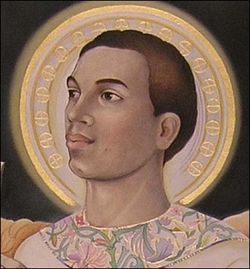 Stoned to death in the year 97.
Stoned to death in the year 97.His father was a Greek gentile, his mother Eunice was Jewish. Converted to Christianity by Saint Paul the Apostle around the year 47, he became a partner, assistant and close friend of Paul. Missionary. Head of the Church in Ephesus. Recipient of two canonical letters from Saint Paul. Martyred for opposing the worship of Dionysius. Prayer... Dear Saint Timothy, well known for your gentleness, you were a most faithful disciple of Saint Paul, and like him traveled much to bring the Good News to all people. The Letters Paul wrote to you reveal your zeal and inspire us with confidence in you. You too were cast into prison and you too gave your life for Christ. So with confidence we dare to ask, please obtain relief for {name of sufferer}, if it be God's will. Amen. 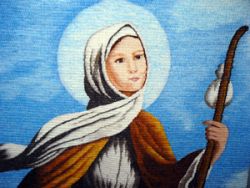 Born: 1474 at Desenzano, Lake Garda, Italy.
Born: 1474 at Desenzano, Lake Garda, Italy.Died: 1540, Brescia, Italy. Franciscan tertiary at age 15. She received a vision telling her she would inspire devout women in their vocation. In Crete, during a pilgrimage to Holy Land, she was struck blind. Her friends wanted to return home, but she insisted on going on, visiting the shrines with as much devotion and enthusiasm as if she had her sight. On the way home, while praying before a crucifix, her sight was restored at the same place where it had been lost. In 1535 she gathered a group of girl students and began what would become the Institute of Saint Ursula (Ursuline Sisters), founded to teach children, beginning with religion and later expanding into secular topics; her first schools were in the Italian cities of Desenzano and Brescia. As our Savior says: "A good tree is not able to produce bad fruit." He says: A good tree, that is, a good heart as well as a soul on fire with charity, can do nothing but good and holy works. For this reason Saint Augustine said: "Love, and do what you will," namely, possess love and charity and then do what you will. It is as if he had said: Charity is not able to sin. Mothers of children, even if they have a thousand, carry each and every one fixed in their hearts, and because of the strength of their love they do not forget any of them. In fact, it seems that the more children they have the more their love and care for each one is increased. Be sincerely kind to every one according to the words of our Lord: "Learn of me, for I am meek and humble of heart." Thus you are imitating God, of whom it is said: "He has disposed all things pleasantly." And again Jesus said: "My yoke is easy and my burden light." - from Spiritual Testament by Saint Angela Merici 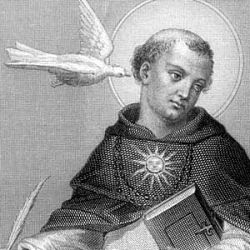 Born: 1225, Naples, Italy.
Born: 1225, Naples, Italy.Died: 1274. Son of the Count of Aquino, born in the family castle in Lombardy near Naples, Italy. Educated by Benedictine monks at Monte Cassino, and at the University of Naples. He secretly joined the mendicant Dominican friars in 1244. His family kidnapped and imprisoned him for a year to keep him out of sight, and deprogram him, but they failed to sway him, and he rejoined his order in 1245. He studied in Paris, France from 1245 to 1248 under Saint Albert the Great, then accompanied Albertus to Cologne, Germany. Ordained in 1250, then returned to Paris to teach. Taught theology at University of Paris. He wrote defenses of the mendicant orders, commentaries on Aristotle and Lombard's Sentences, and some bible-related works, usually by dictating to secretaries. He won his doctorate, and taught in several Italian cities. Recalled by king and university to Paris in 1269, then recalled to Naples in 1272 where he was appointed regent of studies while working on the Summa Theologica. On 6 December 1273 he experienced a divine revelation which so enraptured him that he abandoned the Summa, saying that it and his other writing were so much straw in the wind compared to the reality of the divine glory. He died four months later while en route to the Council of Lyons, overweight and with his health broken by overwork. His works have been seminal to the thinking of the Church ever since. They systematized her great thoughts and teaching, and combined Greek wisdom and scholarship methods with the truth of Christianity. Pope Leo VIII commanded that his teachings be studied by all theology students. He was proclaimed a Doctor of the Church in 1567. "Grant me, O Lord my God, a mind to know you, a heart to seek you, wisdom to find you, conduct pleasing to you, faithful perseverance in waiting for you, and a hope of finally embracing you." - Saint Thomas Aquinas 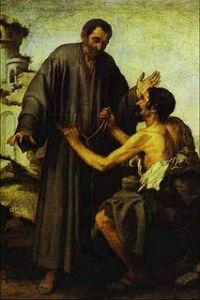 Died 1258.
Died 1258.Franciscan, received into the order by Francis of Assisi himself. Established Franciscan missions is several locations. Arriving in Rome after a long journey, Juniper encountered people who had heard of his sanctity, and had come to see him. Alarmed at this reception, Juniper escaped to a nearby seesaw where he played with the children till the sightseers left disgusted; he then continued to the convent. "Would to God, my brothers, I had a whole forest of such Junipers." - Saint Francis of Assisi "A perfect friar would have "the patience of Brother Juniper, who attained the state of perfect patience because he kept the truth of his low estate constantly in mind, whose supreme desire was to follow Christ on the way of the cross...." - Saint Francis of Assisi 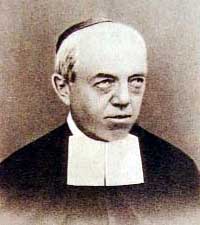 Born: 1841 in Mellet, Hainaut, Belgium as Louis Wiaux
Born: 1841 in Mellet, Hainaut, Belgium as Louis WiauxDied: 1917 at Malonne, Namur, Belgium of natural causes Third of six children of a blacksmith whose family was noted for piety. Louis attended a small country school, and then helped in his father's shop. He joined the Brothers of Christian Schools on 7 April 1852 at age 11, taking the name Mutien Marie, and beginning his novitiate in Namur, Belgium. As a Christian Brother, he taught at several elementary schools near Brussels, Belgium; he was so easy on his students that his classes were known for getting out of hand. He was re-assigned to music and art classes so he could work with small classes, and work individually with students. He soon became an excellent fine arts teacher, and the one-to-one work led many young people to see and follow his excellent example of a holy life devoted to prayer. Prayer... Saintly Brother Mutien-Marie, we ask you to talk to God on our behalf. Lord, May the life of St. Mutien-Marie Wiaux remind us of the value of staying dedicated to a project. Give us a spirit that opens us to religion. Lord, give us today the blessings we need forever and ever. Amen. 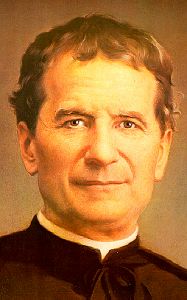 Born: 1815 at Becchi, Castelnuovo d'Asti, Piedmont, Italy as Giovanni Melchior Bosco.
Born: 1815 at Becchi, Castelnuovo d'Asti, Piedmont, Italy as Giovanni Melchior Bosco.Died: January 31, 1888 at Turin, Italy of natural causes. Son of Venerable Margaret Bosco. John's father died when the boy was two years old; and as soon as he was old enough to do odd jobs, John did so to helps support his family. Bosco would go to circuses, fairs and carnivals, practice the tricks that he saw magicians perform, and then put on one-boy shows. After his performance, while he still had an audience of boys, he would repeat the homily he had heard earlier that day in church. He worked as a tailor, baker, shoemaker, and carpenter while attending college and seminary. Ordained in 1841. A teacher, he worked constantly with young people, finding places where they could meet, play and pray, teaching catechism to orphans and apprentices. Chaplain in a hospice for girls. Wrote short treatises aimed at explaining the faith to children, and then taught children how to print them. Friend of Saint Joseph Cafasso, whose biography he wrote, and confessor to Blessed Joseph Allamano. Founded the Salesians of Don Bosco (SDB) in 1859, priests who work with and educate boys, under the protection of Our Lady, Help of Christians, and Saint Francis de Sales. Founded the Daughters of Mary, Help of Christians in 1872, and Union of Cooperator Salesians in 1875. "Fly from bad companions as from the bite of a poisonous snake. If you keep good companions, I can assure you that you will one day rejoice with the blessed in Heaven; whereas if you keep with those who are bad, you will become bad yourself, and you will be in danger of losing your soul." - Saint John Bosco "Enjoy yourself as much as you like - if only you keep from sin." - Saint John Bosco "Do you want our Lord to give you many graces? Visit him often. Do you want him to give you few graces? Visit him seldom. Visits to the Blessed Sacrament are powerful and indispensable means of overcoming the attacks of the devil. Make frequent visits to Jesus in the Blessed Sacrament and the devil will be powerless against you." - Saint John Bosco |




